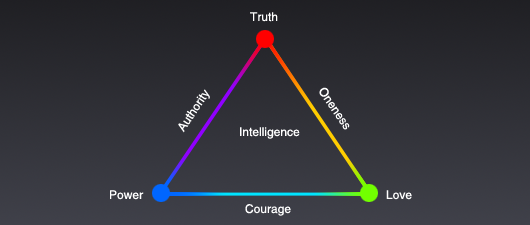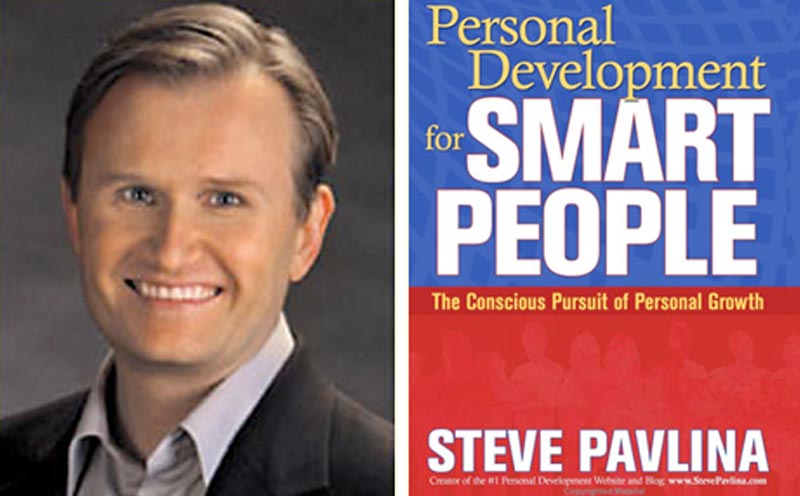When the King of Personal Development Blogging Steve Pavlina announced he was writing a book that promised to reveal the core underlying principles behind all personal growth, you can bet I got pretty excited. I’ve always been curious about the whys behind what we human beings do, and I was curious about what Steve had to say about the differences between people who grow and people who don’t.
I enrolled in his offer for a review copy of Personal Development for Smart People, and happily got it (mine was an e-book version – his publishing house got so many requests from overseas they couldn’t ship everyone a hard copy). I’ve sat with it the last two weekends to read, and this is what I got.
The 3 Essential Keys to Personal Growth
Steve boils the whole of personal development down to three essential principles: truth, love and power. Whether you experience personal growth from practicing Zen, NLP or sports, the core reasons why you do come from follwing these three principles.
He further explains that the next three principles that are essential to successful personal growth stem from a combination of the first three. Oneness stems from an awareness of both truth and love, authority is truth plus power and courage is love with power. Practicing the three fundamental principles leads to the seventh core principle: intelligence.

Steve devotes a chapter to explaining each principle, and in each chapter he offers ways to expand your practice of each principle. After explaining the last principle of intelligence in Part 2, Steve explains how to use these principles in Part 2 to achieve growth in your habits, career, money, health, relationships and spirituality.
Personal Growth Principles vs. Techniques
Personal Development for Smart People is different from most personal development books out there in that it focuses on practice and awareness of principles rather than technique. While there are techniques inside to work on practicing these principles, the focus is instead of giving you set things to do, Steve offers a working direction on which you can center your personal growth.
Essentially, you get a bag of tools to diagnose your personal growth. Whether considering a new job, finding a special someone or seeking a new spiritual path, you can always ask yourself if the change will bring you closer to truth, love and power or move you further from it.
It’s like the difference between teaching someone a technique in a martial art, versus getting them to build up their physical strength, endurance and agility. A technique only does what it’s good for, but a strong body is able to learn even more techniques faster and perform them stronger. Steve is essentially giving you the tools to strengthen your personal development muscles in this book.
Steve Pavlina & the Tree of Life
What Steve found to be the basic first principles of personal development – truth, love and power – resonated with me, but there’s a curious twist as to why. As I was reading his book, I felt an odd sense of déjà vu. You see, for some time now, I’ve said a little affirmation before doing my meditations, and that is for me ‘to grow in wisdom, power and love.’
I only vaguely remember where I got this, and I think I most probably picked it up from reading an Aleister Crowley book in my friend, the modern-day magician Eleutherios’ library. I chatted with Eleutherios for a while about Steve’s book and he confirmed for me where I got my sources, but then he revealed that the basic principles of wisdom, power and love go further back than Crowley as the basic tenants of the Kabbalistic Tree of Life.
I’m not too familiar with the Tree of Life or the Kabbalah, so I won’t go too much into it here. I’m just amused by the striking similarity: either Steve has read the same material or the first principles he discovered had already been discovered hundreds of years back! This wouldn’t be unusual if these principles rang true – principles are that because they’re timeless after all – but Steve might have saved himself some work if he had known 🙂
(Eleutherios and I concluded that the difference between wisdom and truth is just semantics. Truth leads to wisdom, and wisdom leads to truth.)
In Conclusion
To be honest, I found Personal Development for Smart People a little slim, only about 150 pages in total (I wonder if the printed version feels slim in the hands). To be sure, the material is deceptively simple: three little principles for you to shoot towards may sound simple but it’s not always easy.
Therein lies Personal Development for Smart People’s strength, it’s a simple but not easy book for personal growth and what’s inside will give you a framework to work with towards your growth.
I like how the seven principles feel complete. Many personal development books seem to stress one principle over the other; you might get a touchy-feeling book that’s all about love but glosses over the fact that if you don’t have the power to act, that love is useless. While another might be all about telling the truth and achieving power, but without love as balancing hand you might find yourself losing social skills quick.
It’s also a good book to pick up if you’re having trouble in one of the areas in your life that Steve mentions in Part 2: your habits, career, money, health, relationships or spirituality. Personally, I think I would find some of these chapters wanting if I hadn’t read Steve’s website where he goes into more detail there.
To that end, Personal Development for Smart People is a good starter kit and his blog is a great complement for his book. If you’re familiar with his work online, the book deepens your understanding of what he says and helps you understand his work with new eyes. But if you don’t feel like spending the money to buy the book right now, you can still use the material on his blog to deepen your personal growth.
Personal Development for Smart People doesn’t pretend to offer easy techniques to solve your problems in three easy steps, but approaches personal growth from a fundamental ground-up approach. With this book, Steve shows you how to think consciously to achieve the most from personal growth.

